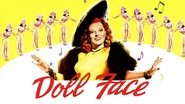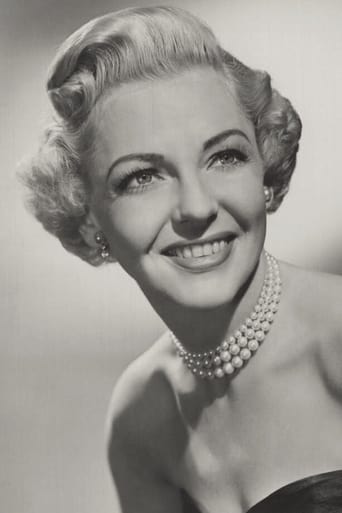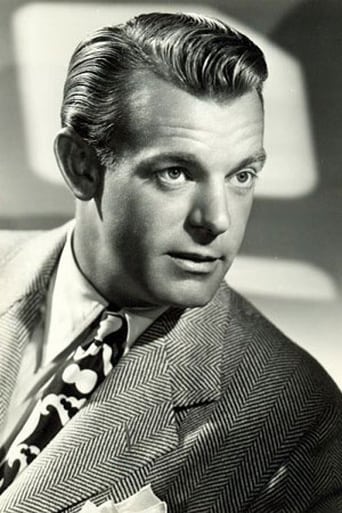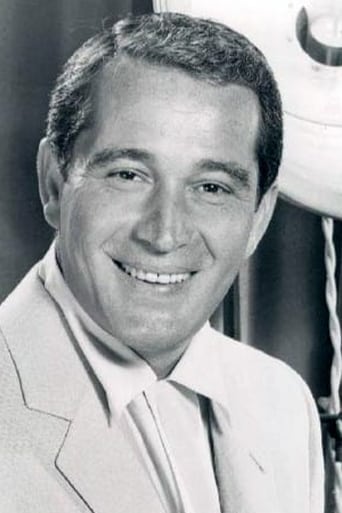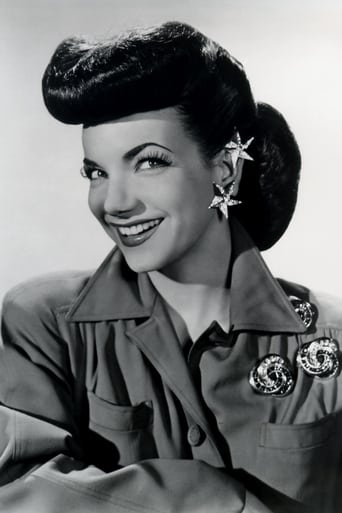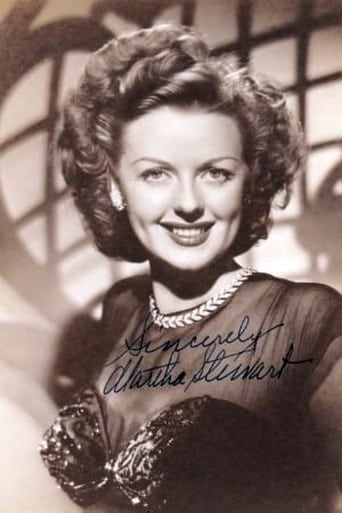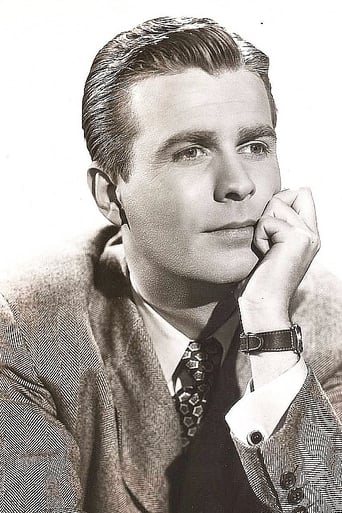Cathardincu
Surprisingly incoherent and boring
Dynamixor
The performances transcend the film's tropes, grounding it in characters that feel more complete than this subgenre often produces.
Taha Avalos
The best films of this genre always show a path and provide a takeaway for being a better person.
Philippa
All of these films share one commonality, that being a kind of emotional center that humanizes a cast of monsters.
vincentlynch-moonoi
This is a very B picture. Nothing spectacular about it, although the story is fairly decent, and is based on the life of Gypsy Rose Lee (played here as "Doll Face" Carroll by Vivian Blaine). Of course, it's highly fictionalized...and I do mean HIGHLY fictionalized! Top billing goes to Blaine, which was a pretty decent actress and singer. No, not "A" line, but darned pleasing. Dennis O'Keefe is Blaine's love interest...another B actor, not as impressive as Blaine. Carmen Miranda is along for some fun, though I never understood the attraction. As mentioned, Joe E. Lewis's wife -- Martha Stewart -- plays Como love interest; also she does "okay", it's clear she was not destined to have a very extensive movie career.But as I mentioned, for nearly 2 years Perry Como had been a rapidly rising singing star with multiple million sellers. This was his first film, and his role was only third billing. Como was a natural on television, and television shows starring male vocalists were all patterned after his success. But, he was far from being a "natural" on the big screen, and while he does okay, his acting leaves a bit to be desired. But his voice here is a strong baritone, and he does nicely soloing or dueting on several numbers -- Perry Como and Martha Stewart on "Somebody's Walking in My Dream", Perry Como solo on "Red Hot and Beautiful", Perry soloing on "Here Comes Heaven Again", Perry and Vivian Blaine on "Here Comes Heaven Again", and Perry Como and Martha Stewart on "Dig You Later (A-Hubba Hubba Hubba)" (which became a Como solo and million seller on RCA Victor records).So, sit back and enjoy a rising Como, a halfway decent story, and a nice performance by Vivian Blaine.
weezeralfalfa
The back of my DVD jacket features a large picture of Carmen Miranda wearing a lighthouse attached to a turban. Curiously, this doesn't appear in the film! However, there is an outtake on my DVD of Carmen prancing around on a burlesque stage in her signature platform sandals, a shimmering skimpy outfit, and this lighthouse headpiece, singing "True to the Navy", with a sailor group backup. According to this web site, somebody at Fox forgot to get permission from Paramount to use the featured song until it was too late to cut out some of the advance film publicity shots when Fox learned that Paramount refused to let them use their song. Thus, we are left with only one Carmen specialty number, and in B&W, whereas in her previous Fox films, she had 2 or 3 specialty numbers, all in gorgeous Technicolor. Her number : "Chico, Chico" is lively , with quite a few 'colorful' background characters. Carmen dances around in bare feet, in a Puerto Rican peasant market place-themed production. She wears a simple turban, but many of the extras have various imaginative headpieces. As in "The Gang's All Here", her changing background occasionally appears to greatly extend her headpiece. Actually, it's one of her best productions. Still, for a woman who practically singlehandedly induced Fox to start filming many of its musicals in color, it must have felt like a slap in the face to have her last 2 Fox musicals done in B&W, and to have, in her last 4 films, some of Fox's "B" musical stars, rather than her accustomed "A" team costars. Perhaps the thinking at Fox was that Carmen, as an established star, could guarantee an audience for films otherwise featuring their "B" leads. On the other hand, it was also true that the need to promote FDR's 'good neighbor ' policy toward Latin America was nearing its end, and the perception was that the novelty of Carmen's outrageous screen persona was beginning to wane with audiences. This is the 3rd of a series of 4 musicals released in 44-46, in which Carmen was teamed with new "B" musical leading lady Vivian Blaine, who basically replaces Alice Faye or Betty Grable in Fox's "A" team, getting to sing the romantic ballads and participate in the main romantic entanglements. Also, established singer, but newcomer to Hollywood, Perry Como was included in 3 of these films, as either primarily a singing specialist or a leading character in the plot. Here, it looks like they wanted him to be the leading romantic man, but knew his acting was stiff and bland, and he often looked sleepy. Hence, better when his screen time and role was limited, as in "Something for the Boys". He sings the slow ballad "Here Comes Heaven Again", once solo, and again with Vivian in the finale. He also sings twice the up tempo romantic piece "Red Hot and Beautiful", with female chorus. But, the hit of the film was the upbeat novelty "Hubba, Hubba, Hubba", also featuring Martha Stewart, in her film debut. A former band singer, Martha would remain a supporting actress in a limited Hollywood career. I remember her as a significant presence in the musicals "I Wonder Who's Kissing Her Now?" and "Are You with It?". At least she actually sang her songs, while some much more hyped actresses were mostly dubbed. After Perry sings his sleepy version of "Somebody's Walking in My Dream", she steps off a crescent moon in the background and does a sexy up tempo version. She again upstages Perry, following his staid 2nd rendition of "Red Hot and Beautiful", with an appropriate sexy version, while prancing around the burlesque stage in mimicry of Vivian's prior performance. Actually, I think she outdoes Vivian as well, being an excellent actress as well as singer. Incidentally, the Wikipedia site and this site fail to credit Martha with this performance, only mentioning Vivian's prior performance! I can't really fault any of the songs. Jimmy McHugh and Harold Adamson did a good job with the all original score. There weren't a lot of songs, so several were used several times, often by more than one soloist. That's better than more songs, but half stinkers!Returning to the hit "Hubba, Hubba, Hubba": Perhaps more than any other song of the times, it expresses the jubilation over the recent conclusion of WWII, thumbing their noses at the defeated Japanese, and telling the servicemen to go home, have some frivolous fun, then find a girl to marry, and get ready for a bright future. The expression "Hubba Hubba" was then in vague as an alternative to a 'wolf whistle', or to denote excitement about anything. In this production, both usages are evident. Vivian used it informally in her next film: "If I'm Lucky".As others have detailed, the screenplay is rather trifling and standard fare, with the lead female going back and forth between 2 men, and with the much repeated ambition to rise from low class performances to Broadway status. Unlike most of her other Fox films, Carmen doesn't have anyone with comedic talent to interact with. Too bad someone like Bob Hope, Red Skelton,or Phil Silvers wasn't included, as she had great comedic talent, given the right setup. Instead of comedy between the musical numbers, as in "Something for the Boys", we get mostly lackluster drama. Yep, the male leads and supports were all pretty faceless, save for Perry, and their romance with 'Doll Face' unconvincing. Nor does Vivian make a convincing stripper. If you have a DVD, fast forward between the musical numbers, and you won't miss much.
MartinHafer
"Women are like rugs---you gotta take 'em out and beat 'em every once in a while"--Dennis O'Keefe from DOLL FACE.In many ways, this film reminded me of BORN YESTERDAY--though this film came out a year before Garson Kanin and Ruth Gordon's hit play debuted on Broadway--and five years before the movie version of BORN YESTERDAY debuted. Both feature an uncouth couple with an abusive and indifferent boyfriend and both feature a cultured writer who educates and enlightens the tacky leading lady. However, BORN YESTERDAY was a comedy and DOLL FACE was an unconvincing musical...and I can see why it has sunk into the public domain--it just isn't that good a film. Part of this is the poor script, part of it is too much dull musical numbers and part of it is because the male love interest, Dennis O'Keefe, is a rather abusive and neglectful man--and seeing him getting the girl (Vivian Blaine) in the end was a bit disturbing. After all, this is the same character who uttered the charming quote above!! Perhaps my feelings are colored by a more modern sensibility that does NOT condone jerk boyfriends, but I am pretty sure audiences of the day also might have felt unsatisfied with this as well. Regardless, it's a very forgettable film that started off well enough but really bogged down as the film progressed.If you care, Perry Como and Carmen Miranda also starred in the film but their talents (particularly Como's) were rather wasted. Como just sang a lot but had the personality of saw dust.
tpanebia
I came across this movie only as an inclusion in the Carmen Miranda Collection, and I am commenting here for those in the same situation, who are wondering if this is worth having.As for Carmen: she sings one number, "Chico Chico (from Porto Rico!)", which features a lot of dancing with the chorus. The main drawback as far as Carmen is concerned is that the film is in black and white, and we are deprived of some of the gaudiness and festiveness that we expect from her participation in a movie. I know that Technicolor was expensive, but it seems bizarre for Fox to have made black and white musicals after the public came to expect color, and to cast the colorful Carmen Miranda in them! A better number was excised from the movie, but included in the Special Features --- Carmen wears her famous outfit with the phallic lighthouse atop her head (which lights up on the downbeats at the end of the song), and the number is done in a burlesque style on a runway. Carmen gets quite a bit of dialogue in this movie, and is actually integrated into the plot, not just a nightclub performer as in some films (like "Down Argentine Way"). I wish she were given more musical numbers to do, though. One funny bit (five seconds long) has Carmen's character, "Chita," disparagingly mimic Carmen Miranda! The movie itself is watchable and has some fun moments, but on the whole suffers from a bland cast. Vivian Blaine lacked the spark of an Alice Faye or Betty Grable, the other Fox stars of the day, and came across as brittle and not particularly likable. The leading men, including Perry Como, were also uninteresting, and there is even a misogynistic undertone to the movie, with male characters bragging about beating their girlfriends to keep them in line. There is something wince-inducing about seeing bland Perry Como threaten to beat his girlfriend, who gets turned on by it! As for the music, there are a couple of serviceable numbers, but they are reprised to death -- I found myself muttering "oh no, not this one again" by the middle of the movie. Como and Blaine's "Hubba Hubba" duet was the only number which for me was fresh and fun, and not overdone.In general, this is not a terrible or unpleasant film, but is not one many would want to rewatch. As another commenter noted, the melodrama seems to take over at times, and for me, the characters are not sympathetic or likable enough for me to get drawn in by the non-musical aspects of the plot. If you are wondering whether this adds anything of value to the Carmen Miranda collection --- in my opinion, it is only a very minor addition.

